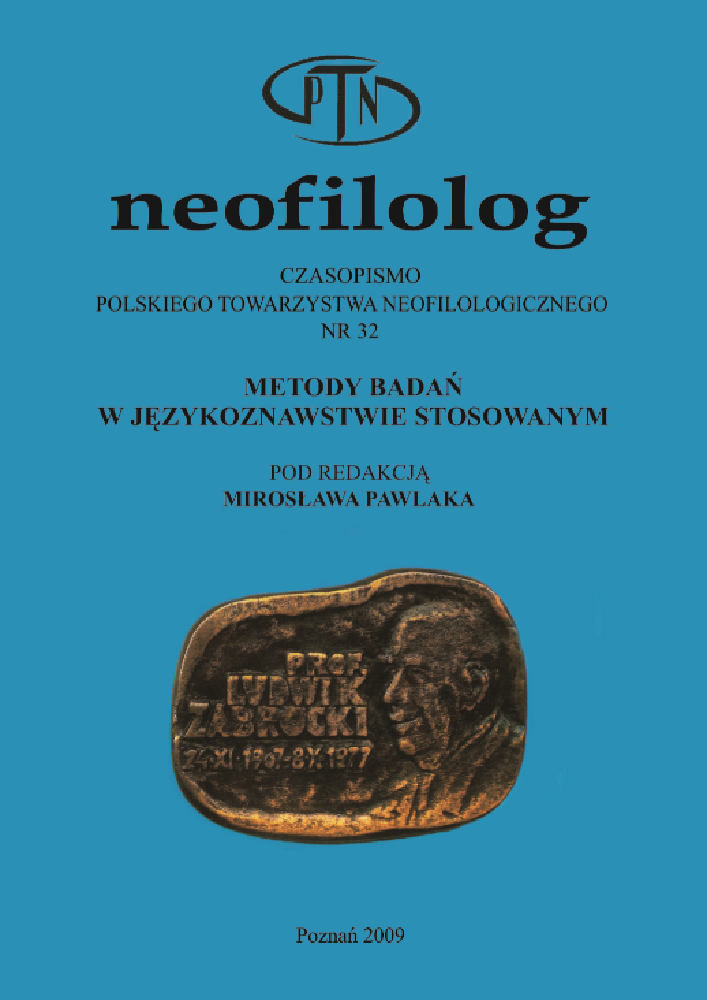Abstrakt
The purpose of this article is to show how action research is used as a research method in foreign language didactics. Six articles have been chosen from refereed journals and analyzed in respect to such categories as research questions and problems, research aims, the relationship between research participants and researcher, research procedures, data collection methods, results and research quality. This initial analysis reveals that action research studies (1) do not easily fall into one distinct research paradigm, (2) can be both quantitative and qualitative, or mixed, (3) collaboration of research participants is often very limited, and (4) there are problems with quality criteria.
Bibliografia
Block, D. 1997. „Learning by listening to language learners”. System 25. 347-360.
Brzeziński, J. 1996. Metodologia badań psychologicznych. Warszawa: Wydawnictwo Naukowe PWN.
Burns, A. 1999. Collaborative action research for English language teachers. Cambridge: Cambridge University Press.
Carr, W. i Kemmis, S. 1986. Becoming critical: Education, knowledge and action research. Lewes, Sussex: Falmer Press.
Cassell, C. i Johnson, P. 2006. „Action research: Explaining the diversity”. Human Relations 59. 783-814.
Crawford Camiciottoli, B. 2003. „Metadiscourse and ESP reading comprehension: An exploratory study”. Reading in a Foreign Language 15. (http://nflrc.hawaii.edu/rfl/. (DW) 15.01.2009).
Edge, J. (red.). 2001. Action research. Alexandria, VA: TESOL.
Ellis, R. 1998. „Teaching and research: Options in grammar teaching”. TESOL Quarterly 32. 39-60.
Gnitecki, J. 2007. Wprowadzenie do pedagogiki ogólnej. Poznań: Wydawnictwo Naukowe Polskiego Towarzystwa Pedagogicznego.
Hall Haley, M. 2004. „Learner-centered instruction and the theory of multiple intelligences with second language learners”. Teachers College Record 106. 163-180.
Herr, K. i Andersen, G. L. 2005. The action research dissertation. Thousands Oaks: Sage Publications.
Huang, J. 2005. „Metacognition training in the Chinese university classroom: An action research study”. Educational Action Research 13. 413-434.
Kamiński, A. 1974. „Metoda, technika, procedura badawcza w pedagogice empirycznej”, w: Wroczyński, R. i Pilch, T. (red.). 1974. 25-48.
Kemmis, S. i McTaggart, R. (red). 1981. The action research planner. Geelong, Victoria: Deakin University Press.
Kotarbiński, T. 1990 [1929]. Elementy teorii poznania, logiki formalnej i metodologii nauk. Dzieła wszystkie. Tom 1. Wrocław: Ossolineum.
Kupetz, R. i Ziegenmeyer, B. 2006. „Flexible learning activities fostering autonomy in teaching training”. ReCALL 18. 63-82.
Łobocki, M. 2006. Metody i techniki badań pedagogicznych. Kraków: Impuls.
Markee, N. 1996. „Making second language classroom research work”, w: Schachter, J. i Gass, S. (red.). 1996. 117-156.
Mavor, S. 2001. „Socio-culturally appropriate methodologies for teaching and learning in a Portuguese university”. Teaching in Higher Education 6. 183-201.
McFee, G. 1993. „Reflections on the nature of action research”. Cambridge Journal of Education 23. 173-183.
Michońska-Stadnik, A. i Szulc-Kurpaska, M. (red.) 1997. Action research in the Lower Silesia Cluster Colleges with Prince Project. Legnica: Orbis Linguarum.
Newman, I., Ridenour, C. S., Newman, C. i DeMarco, G. M. P. 2003. „A typology of research purposes and its relationship to mixed methods”, w: Tashakkori, A. i Teddlie, C. (red.). 2003. 167-188.
Nowak, S. 2008. Metodologia badań społecznych. Warszawa: Wydawnictwo Naukowe PWN.
Nunan, D. 1988. The learner-centered curriculum. Cambridge: Cambridge University Press.
Nunan, D. 1992. Research methods in language learning. Cambridge: Cambridge University Press.
Onwuegbuzie, A. J. i Leech, N. L. 2006. „Linking research questions to mixed methods data analysis procedures”. The Qualitative Report. 474-498.
Öztürk, H. i Çeçen, S. 2007. „The effects of portfolio keeping on writing anxiety of EFL students”. Journal of Language and Linguistic Studies 3. (http://www.jlls/org/index.htm).
Pilch, T. i Bauman, T. 2001. Zasady badań pedagogicznych. Strategie ilościowe i jakościowe. Warszawa: Wydawnictwo Akademickie „Żak”.
Roberts, J. 1998. Language teacher education. London: Edward Arnold.
Rubacha, K. 2008. Metodologia badań nad edukacją. Warszawa: Wydawnictwa Akademickie i Profesjonalne.
Sachs, G. T. 2002. Action research in English language teaching. Hong Kong: City University.
Schachter, J. i Gass, S. (red.). 1996. Second language classroom research. Issues and opportunities. Mahwah, NJ: Lawrence Erlbaum.
Such, J. i Szcześniak, M. 1997. Filozofia nauki. Poznań: Wydawnictwo Naukowe UAM.
Sztumski, J. 1999. Wstęp do metod i technik badań społecznych. Katowice: Śląsk.
Tashakkori, A. i Teddlie, C. (red.). 2003. Handbook of mixed methods in social and behavioral research. Thousands Oaks, CA: Sage.
Wallace, M. J. 1991. Action research for language teachers. Cambridge: Cambridge University Press.
Wilson, H. N. 2004. „Towards rigour in action research: A case study in marketing planning”. European Journal of Marketing 38. 378-400.
Woodward, T. 1991. Models and metaphors in language teacher training. Cambridge: Cambridge University Press.
Wroczyński, R. i Pilch, T. (red.). 1974. Metodologia pedagogiki społecznej: praca zbiorowa. Wrocław: Zakł. Nar. im. Ossolińskich.
Wyka, A. 1985. „Model badań poprzez wspólne doświadczenie czyli o pewnej empirii ‘jakościowej’”. Kultura i Społeczeństwo XXIX. 93-115.
Licencja
Prawa autorskie (c) 1970 Danuta Wiśniewska

Utwór dostępny jest na licencji Creative Commons Uznanie autorstwa – Bez utworów zależnych 4.0 Międzynarodowe.
Przedstawiany utwór (artykuł) upubliczniany jest na podstawie umowy z autorem i na licencji Creative Commons Attribution-NoDerivatives 4.0 International (CC BY-ND 4.0).
Użytkownicy mają obowiązek podania wraz z rozpowszechnionym utworem, informacji o autorstwie, tytule, źródle (odnośniki do oryginalnego utworu, DOI) oraz samej licencji;
- bez tworzenia utworów zależnych,
- utwór musi być zachowany w oryginalnej postaci.
Uniwersytet im. Adama Mickiewicza w Poznaniu zachowuje prawo do czasopisma jako całości (układ, forma graficzna, tytuł, projekt okładki, logo itp.).
